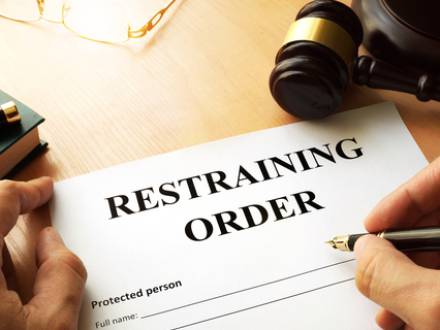Supreme Court Addresses Restraining Orders and Firearm Possession
 While the Second Amendment to the U.S. Constitution ensures that people in the United States have the right to bear arms, there are some limitations on this right. State and federal laws related to firearm possession are updated regularly, and rulings by the Supreme Court have addressed how these laws may apply. One recent decision addressed whether people who are subject to restraining orders based on accusations of domestic violence may be prohibited from possessing firearms.
While the Second Amendment to the U.S. Constitution ensures that people in the United States have the right to bear arms, there are some limitations on this right. State and federal laws related to firearm possession are updated regularly, and rulings by the Supreme Court have addressed how these laws may apply. One recent decision addressed whether people who are subject to restraining orders based on accusations of domestic violence may be prohibited from possessing firearms.
Understanding the laws that apply to firearm possession can be crucial for people who have been accused of domestic abuse or other related offenses. Violations of these laws can result in weapons charges, and a person who is convicted may face serious penalties. An experienced Connecticut criminal defense attorney can provide guidance and legal representation to people in these situations, ensuring that their rights will be protected.
Supreme Court Upholds Laws Barring Firearm Possession for People Subject to Domestic Violence Restraining Orders
For decades, state and federal laws have placed restrictions on people who have been accused of domestic violence. When restraining orders or orders of protection are taken out against a person who allegedly engaged in domestic abuse, stalking, harassment, or related offenses, that person will be prohibited from possessing firearms. They will typically be required to surrender any guns they own to law enforcement, and they will face criminal charges if they possess any firearms while a restraining order is in effect.
The legality of these laws has been called into question following a ruling by the Supreme Court in 2022. In the case of New York State Rifle & Pistol Association v. Bruen, the court found that laws restricting firearm possession are only valid if they are based on the "history and tradition" of firearm laws in the United States. Some advocates for firearm ownership rights have argued that there is no long-standing tradition dating back to the founding of the United States that prohibits people accused of domestic violence from owning firearms.
The Supreme Court addressed this issue in the case of United States v. Rahimi. In this case, a man in Texas faced criminal charges based on the possession of firearms while he was subject to a domestic violence restraining order. Based on the Bruen decision, he argued that the law restricting his right to possess firearms was unconstitutional, and the U.S. Court of Appeals for the 5th Circuit ruled in his favor. However, the Supreme Court overturned this ruling, finding that there have been laws throughout the history of the United States that are "relevantly similar" to the law in question. This ruling ensures that existing laws prohibiting firearm possession by people subject to restraining orders will remain in place.
Federal and State Laws Prohibiting Firearm Possession in Cases Involving Restraining Orders
There are multiple laws that may apply in situations where people are accused of violating restraining orders by possessing firearms. Under federal law, anyone subject to a court order based on accusations of harassment, stalking, threatening, or taking actions that threatened the safety of an intimate partner or child is prohibited from possessing or receiving a firearm or ammunition that has been shipped or transported through multiple states or countries. Connecticut law also imposes restrictions on firearm possession by anyone who is subject to a restraining order or protective order, and a person who violates this law may be charged with a Class C felony.
Contact Our Connecticut Weapons Charges Attorney
If you have been accused of possessing a firearm in violation of a restraining order, you may be facing serious criminal penalties. To address these charges and defend against a conviction, it is crucial to work with an experienced Hartford restraining order violation defense lawyer. At Woolf & Ross Law Firm, LLC, we can help you understand the best ways to address these issues, and we can provide effective legal representation during your case. To set up a free consultation and learn more about how we can help you, contact us at 860-290-8690.






